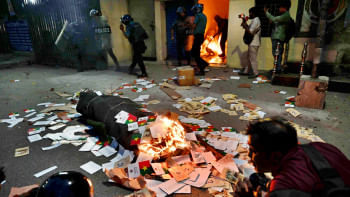Tunisian election: Stability vs democracy paradox in Middle East

Photo: AP
A stable and democratic Middle East is essentially vital component for global peace. The Arab spring has brought a historic moment of democratising this conflict-ridden region of the world. With the fall of the dictators previously suppressed Islamist parties are emerging in power. Question remains whether continuation of US policy of double standard in the region would destroy the fruits of democratisation and pave the door for emergence of radical forces in the region making the Middle East more unstable in the coming decade.
The Middle East has been the center of gravity of global politics in the late 2oth century and with reinforced gravity in the 21st century. For decades, controlling this region has been the focal point for the United States, Britain, France and others who even supported dictatorships and monarchies overthrowing democracies. For the sake of control they, with the United States on the cockpit, designed strategies for how this region should be run. A stable Middle East was the utmost necessity to keep global economy functioning, a reality the world saw for a decade after 1973 Opec oil embargo. It was followed by a robust regime control mechanism in the region putting stability as the guiding principle of foreign policy of western powers. In 2005, the then US Secretary of State Condoleezza Rice famously told an audience that America which had traditionally supported stability over democracy had "achieved neither". The west saw that anti-western forces from Middle East were reaching its heartlands. America never thought such adventure was feasible for any power in this century. This time, unprecedentedly, the enemies are non-state actors unlike Japan which attacked in Pearl Harbor during WWII. It was a clear manifestation of volcanic eruption of western, American in particular, policy of supporting Israel and the dictators in Middle East who with the help of the west were ruling the country suppressing peoples' will. This helped to grow anti-Americanism in Middle East which culminated in rise of Al-Qaeda and the resultant attacks on Twin Tower and Pentagon. 9/11 brought a paradigm shift in the foreign policy strategy of the United States vis-à-vis this volatile region of the world.
Immediately after 9/11, President George W. Bush declared that region's long-term stability can be guaranteed only by democratisation. Democratisation is the only way to prevent the empowerment of radical Islamists. He thought Islamic movements seek an advantage in the milieu of authoritarianism because when political freedom and organization are constrained, the mosque becomes one of the few viable arenas for collective activism. Opening up the political system and expanding political freedoms would "level the playing field" in the Arab world and increase the ability of Arab societies to debate, test, and reject the claims of the radical Islamist movement. On this reasoning, President Bush attacked Iraq and provided justification that it would a have "domino effect" in other Arab countries. The efficacy of this calculation was extremely debated. For many said that, Iraq created an instance of unstable democracy. Let's leave the onus of verdict of this on the shoulder of history. However, the historic moment of Arab spring has raised this hope once again that the fantasy of spreading democracy and freedom is finally going to unveil its reality.
Ever since a man in Tunisia burned himself to death in December 2010 in protest at his treatment by police, People at last woke up and launched pro-democracy rebellions across the Middle East. This spring spread everywhere, where suppressed humanity so far sought to live free from the scourge of tyranny and injustice. Tunisia, Egypt and Libya are now free from rule of dictators. If history doesn't betray, Yemen and Syria are coming next and will receive the same consequence. The underlying motive behind this Arab spring is the so-called democratization program which Condoleezza rice said "birth-pangs of a new Middle East" and in the words of Hilary Clinton "US has nothing to do with what is happening". Now the billion-dollar question is will democracy bring stability in Middle East? Will Middle East get a set up as America is looking for? Will democracy pave the way for peace and security in Middle East? For this answer, it deserves a deep look inside.
Historically, when democratic elections were held, they often delivered outcomes at odds with Washington's hopes and intentions. US backed Iranian revolution in 1979 and Hamas' victory in Palestinian elections in 2006 raised significant doubts about the wisdom of a U.S. strategy built around promoting democracy for stability. Today is not different. The post-dictatorial Middle East is now experiencing an ascendency of Islamic forces across the region. It might create a future ground of potential clash with the United States if it doesn't support US interests in Middle East, much the same case with Iran today.
It is seen that anti-US forces in Middle East have been crushed by the dictators who floated their regimes on US support. But the aftermath of fall of these tyrants is bringing all those have been oppressed for decades. They are seen being keen to drive people's emotions and draw their sympathy for their cause. On October 24 election in Tunisia, Islamist party Annahda won over 42 percent of seats in Tunisia's constituent assembly in the country's first democratic election. The members of this party were fiercely persecuted and exiled. After Zine el-Abidine Ben Ali was ousted from power it started to strengthen its foot on the ground. The party leader Rashid Ghannouchi has spoken frequently about the model of Turkey's AKP. Ghannouchi, ultimately settling in Britain, remained in exile in for 22 years, until this January, when he returned to Tunisia and hailed like a hero. Historically, exiled leaders are seen gaining the power in Middle East: Imam Khomeni from France, Ghannouchi and Mustafa Abdel Jalil of Libyan NTC leader from Britain. All of them were exiled in the west and participated in the revolution from there. Annahda told its supporters for not coming to the airport to meet Ghannouchi upon his return for the fear that, it might create images reminiscent of Khomeini's return to Iran. Annahda politicians have made every effort to reassure Tunisian liberals and Western observers that they will protect civil rights and support democracy. Modern and liberal though in its manifesto, Annahda would face the anti-us sentiments of Salafist Muslims in Tunisia. Many say serving US interest in Middle East and ruling the country according to Islamic norms and practices are counterproductive. During election campaign of Annahda, slogans like "no to American military bases, no to foreign interventions" marked a contrast of what United States hopes from this regime change in Tunisia. The NTC in Libya declared they would adopt Sharia law. The Muslim Brotherhood in Egypt is strategising about how best to score political gains.
Providing a long and extended security umbrella to Israel and vetoing the will of freedom of Palestinian people by USA casts doubts whether a US dominated Middle East would be supported by Arab mass ruled by Islamists. If this Arab Spring is an answer to injustice by dictators to own people, what would America expect from siding with Israel which is founded on the brick of injustice? The democratisation program in Middle East can bounce back if US's ignoring of Arab cause continues. With Islamic traditions in practice, in new Islamic regimes, it will spawn new states more akin to the principles of al Qaeda and precipitate the rise of a "radical regime". Such a situation would only destabilize the region with democracy providing the space for radicals to power.

 For all latest news, follow The Daily Star's Google News channel.
For all latest news, follow The Daily Star's Google News channel. 



Comments